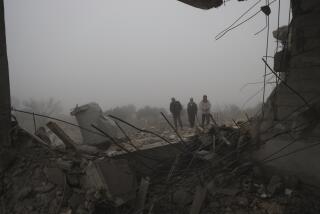Iraqi Foreign Minister to Visit Iran; 1st in Decade
- Share via
NICOSIA, Cyprus — Iraq will send Foreign Minister Tarik Aziz and other officials to Iran on Sunday, the first such high-level visit since war broke out between the two nations 10 years ago, the Iraqi News Agency reported Thursday.
And in Tehran, a newspaper close to Iranian President Hashemi Rafsanjani said Thursday that Iran may send food and medicine to Iraq despite a U.N. economic embargo.
Rafsanjani said last month that Iran would abide by the embargo aimed at forcing Iraq to withdraw from Kuwait, which it invaded Aug. 2.
The Aziz visit was agreed to before Iraq invaded Kuwait. But thanks to concessions that Iraq has since made, it will aim to create conditions for a direct meeting between Iraqi President Saddam Hussein and Rafsanjani.
Hussein has wanted such direct talks for years but Iran has refused.
Last month, an increasingly isolated Saddam Hussein accepted Tehran’s demands for an Iraqi withdrawal from territory occupied in the closing stages of the Iran-Iraq War, which ended in a cease-fire in August, 1988.
No Iraqi foreign minister has visited Tehran since the Islamic revolution that ousted Iran’s Shah Mohammed Reza Pahlavi in 1979.
Iran has condemned Iraq’s invasion of Kuwait, but it also has criticized the deployment of the U.S.-led multinational force in the Persian Gulf region. It has also called for the removal of foreigners from Saudi Arabia, the site of two of Islam’s holiest sites, and for an Arab solution to the conflict.
It was not immediately clear what political benefits Tehran would gain by helping Iraq counter the economic siege.
But the English-language Tehran Times said in an editorial: “There is a humanitarian question that has to be pondered upon in Iran these days.
“Should the Islamic Republic help the Iraqi Muslim people in these hard times when they are facing an economic blockade?”
It added: “Iran is certainly able to solve almost all food and medicine problems the 16 million population of Iraq is presently facing.”
It said the issue would have to be decided by Iran’s National Security Council, but stressed: “Iran . . . has every right to look at the current gulf crisis from the perspective of its own national interests.”
More to Read
Sign up for Essential California
The most important California stories and recommendations in your inbox every morning.
You may occasionally receive promotional content from the Los Angeles Times.













